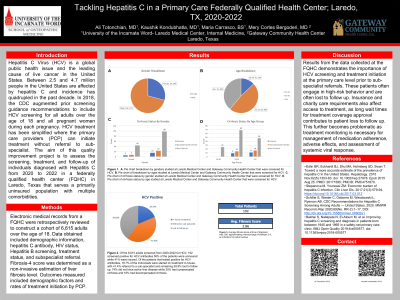Monday Poster Session
Category: Liver
P2355 - Tackling Hepatitis C in a Primary Care Federally Qualified Health Center: Laredo, TX, 2020-2022
Monday, October 23, 2023
10:30 AM - 4:15 PM PT
Location: Exhibit Hall

Has Audio
- AT
Ali Totonchian, MD
Laredo Medical Center
Laredo, TX
Presenting Author(s)
Ali Totonchian, MD1, Kaushik Kondubhatla, MD1, Maria F. Carrasaco, BS2, Mery Cortes Bergoderi, MD3
1Laredo Medical Center, Laredo, TX; 2University of the Incarnate Word, San Antonio, TX; 3Gateway Community Health Center, Laredo, TX
Introduction: Hepatitis C Virus (HCV) is a global public health issue and the leading cause of live cancer in the United States. Between 2.5 and 4.7 million people in the United States are affected by hepatitis C and incidence has quadrupled in the past decade. In 2018, the CDC augmented prior screening guidance recommendations to include HCV screening for all adults over the age of 18 and all pregnant women during each pregnancy. HCV treatment has been simplified where the primary care providers (PCP) can initiate treatment without referral to sub-specialist. The aim of this quality improvement project is to assess the screening, treatment, and follow-up of individuals diagnosed with Hepatitis C from 2020 to 2022 in a federally qualified health center (FQHC) in Laredo, Texas that serves a primarily uninsured population with multiple co-morbidities.
Methods: Electronic medical records from a FQHC were retrospectively reviewed to construct a cohort of 6,615 adults over the age of 18. Data obtained included demographic information, hepatitis C antibody, HIV status, Hepatitis B screening, treatment status, and subspecialist referral. Fibrosis-4 score was determined as a non-invasive estimation of liver fibrosis level. Outcomes measured included demographic factors and rates of treatment initiation by PCP.
Results: Of the 6,615 adults screened from 2020-2022 for HCV, 192 screened positive for HCV antibodies. 59% of the patients were uninsured while 41% were insured. Of the patients that tested positive for HCV antibodies, 18.7% of the individuals were started on treatment in-house, with 41.4% referred to a sub-specialist and remaining 39.9% lost to follow up. 74% did not have active liver disease while 20% had compensated cirrhosis and 16% had decompensated cirrhosis. Average fibrosis score at time of diagnosis was 2.86.
Discussion: Results from the data collected at the FQHC demonstrates the importance of HCV screening and treatment initiation at the primary care level prior to sub-specialist referrals. These patients often engage in high-risk behavior and are often lost to follow up. Insurance and charity care requirements also affect access to treatment, as long wait times for treatment coverage approval contributes to patient loss to follow up. This further becomes problematic as treatment monitoring is necessary for management of medication adherence, adverse effects, and assessment of systemic viral response.
Disclosures:
Ali Totonchian, MD1, Kaushik Kondubhatla, MD1, Maria F. Carrasaco, BS2, Mery Cortes Bergoderi, MD3. P2355 - Tackling Hepatitis C in a Primary Care Federally Qualified Health Center: Laredo, TX, 2020-2022, ACG 2023 Annual Scientific Meeting Abstracts. Vancouver, BC, Canada: American College of Gastroenterology.
1Laredo Medical Center, Laredo, TX; 2University of the Incarnate Word, San Antonio, TX; 3Gateway Community Health Center, Laredo, TX
Introduction: Hepatitis C Virus (HCV) is a global public health issue and the leading cause of live cancer in the United States. Between 2.5 and 4.7 million people in the United States are affected by hepatitis C and incidence has quadrupled in the past decade. In 2018, the CDC augmented prior screening guidance recommendations to include HCV screening for all adults over the age of 18 and all pregnant women during each pregnancy. HCV treatment has been simplified where the primary care providers (PCP) can initiate treatment without referral to sub-specialist. The aim of this quality improvement project is to assess the screening, treatment, and follow-up of individuals diagnosed with Hepatitis C from 2020 to 2022 in a federally qualified health center (FQHC) in Laredo, Texas that serves a primarily uninsured population with multiple co-morbidities.
Methods: Electronic medical records from a FQHC were retrospectively reviewed to construct a cohort of 6,615 adults over the age of 18. Data obtained included demographic information, hepatitis C antibody, HIV status, Hepatitis B screening, treatment status, and subspecialist referral. Fibrosis-4 score was determined as a non-invasive estimation of liver fibrosis level. Outcomes measured included demographic factors and rates of treatment initiation by PCP.
Results: Of the 6,615 adults screened from 2020-2022 for HCV, 192 screened positive for HCV antibodies. 59% of the patients were uninsured while 41% were insured. Of the patients that tested positive for HCV antibodies, 18.7% of the individuals were started on treatment in-house, with 41.4% referred to a sub-specialist and remaining 39.9% lost to follow up. 74% did not have active liver disease while 20% had compensated cirrhosis and 16% had decompensated cirrhosis. Average fibrosis score at time of diagnosis was 2.86.
Discussion: Results from the data collected at the FQHC demonstrates the importance of HCV screening and treatment initiation at the primary care level prior to sub-specialist referrals. These patients often engage in high-risk behavior and are often lost to follow up. Insurance and charity care requirements also affect access to treatment, as long wait times for treatment coverage approval contributes to patient loss to follow up. This further becomes problematic as treatment monitoring is necessary for management of medication adherence, adverse effects, and assessment of systemic viral response.
Disclosures:
Ali Totonchian indicated no relevant financial relationships.
Kaushik Kondubhatla indicated no relevant financial relationships.
Maria Carrasaco indicated no relevant financial relationships.
Mery Cortes Bergoderi indicated no relevant financial relationships.
Ali Totonchian, MD1, Kaushik Kondubhatla, MD1, Maria F. Carrasaco, BS2, Mery Cortes Bergoderi, MD3. P2355 - Tackling Hepatitis C in a Primary Care Federally Qualified Health Center: Laredo, TX, 2020-2022, ACG 2023 Annual Scientific Meeting Abstracts. Vancouver, BC, Canada: American College of Gastroenterology.
